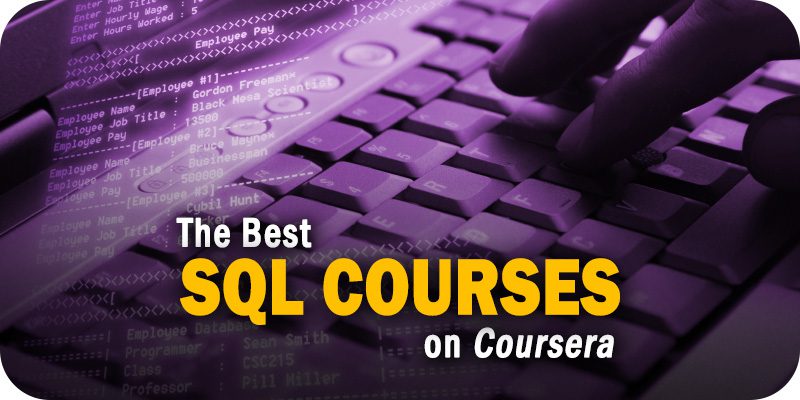The 6 Best SQL Courses on Coursera to Consider for 2025


The editors at Solutions Review have compiled this list of the best SQL courses on Coursera to consider taking.
 SQL (short for structured query language) is a domain-specific language used in programming and is designed for managing data held in a relational database management system. The language is most useful for handling structured data and offers advantages like the concept of accessing many records with one single command and eliminating the need to specify how to reach a record over older read-write APIs.
SQL (short for structured query language) is a domain-specific language used in programming and is designed for managing data held in a relational database management system. The language is most useful for handling structured data and offers advantages like the concept of accessing many records with one single command and eliminating the need to specify how to reach a record over older read-write APIs.
With this in mind, we’ve compiled this list of the best SQL courses on Coursera if you’re looking to grow your skills for work or play. Coursera is one of the top online education platforms in the world, partnering with more than 200 universities and companies to provide a range of learning opportunities. The platform touts more than 77 million learners around the globe. This list of the best SQL courses on Coursera below includes links to the modules and our take on each.
The Best SQL Courses on Coursera
TITLE: Databases and SQL for Data Science with Python
OUR TAKE: This popular Coursera SQL training has a top rating of 4.7 stars. It introduces relational database concepts so you can perform queries in a data science environment. No prior knowledge is required.
Description: The emphasis in this course is on hands-on and practical learning. As such, you will work with real databases, real data science tools, and real-world datasets. You will create a database instance in the cloud. Through a series of hands-on labs, you will practice building and running SQL queries. You will also learn how to access databases from Jupyter notebooks using SQL and Python.
GO TO TRAININGTITLE: SQL for Data Science
OUR TAKE: Led by Accenture’s AI Strategy Consultant Sadie St. Lawrence, this SQL training starts you off working with different types of data like strings and numbers to discuss methods of filtering and paring down results.
Description: This course is designed to give you a primer in the fundamentals of SQL and working with data so that you can begin analyzing it for data science purposes. You will begin to ask the right questions and come up with good answers to deliver valuable insights for your organization. This course starts with the basics and assumes you do not have any knowledge or skills in SQL.
GO TO TRAININGTITLE: Introduction to Structured Query Language (SQL)
OUR TAKE: Led by the University of Michigan’s Clinical Professor Charles Russell Severance, this module walks students through installation steps for installing a text editor, installing MAMP or XAMPP and creating a MySql Database.
Description: Part of the Web Applications for Everybody Specialization, you’ll learn about single table queries and the basic syntax of the SQL language, as well as database design with multiple tables, foreign keys, and the JOIN operation. Lastly, you’ll learn to model many-to-many relationships like those needed to represent users, roles, and courses.
GO TO TRAININGTITLE: Managing Big Data with MySQL
OUR TAKE: This Duke University training is instructed by Daniel Egger and Jana Schaich Borg, it takes roughly 32 hours to complete and offers flexible deadlines based on your schedule.
Description: Part of the Excel to MySQL: Analytic Techniques for Business Specialization, you will learn how relational databases work, and how to use entity-relationship diagrams to display the structure of the data held within them. You will also learn how to execute the most useful query and table aggregation statements for business analysts, and practice using them with real databases.
GO TO TRAININGTITLE: Foundations for Big Data Analysis with SQL
OUR TAKE: In partnership with Cloudera, this beginner-level Coursera SQL training is instructed by Glynn Durham. By the end, students will be able to distinguish operational from analytic databases and understand they are applied to big data.
Description: In this course, you’ll get a big-picture view of using SQL for big data, starting with an overview of data, database systems, and the common querying language (SQL). Then you’ll learn the characteristics of big data and SQL tools for working on big data platforms. You’ll also install an exercise environment (virtual machine) to be used through the specialization courses.
GO TO TRAININGTITLE: Analyzing Big Data with SQL
OUR TAKE: This beginner-level course takes roughly 18 hours to complete and is the second course in the Modern Big Data Analysis with SQL Specialization. The module features top instructor Ian Cook of Cloudera.
Description: In this course, you’ll get an in-depth look at the SQL SELECT statement and its main clauses. The course focuses on big data SQL engines Apache Hive and Apache Impala, but most of the information is applicable to SQL with traditional RDBMs as well; the instructor explicitly addresses differences for MySQL and PostgreSQL.
GO TO TRAININGSolutions Review participates in affiliate programs. We may make a small commission from products purchased through this resource.





















